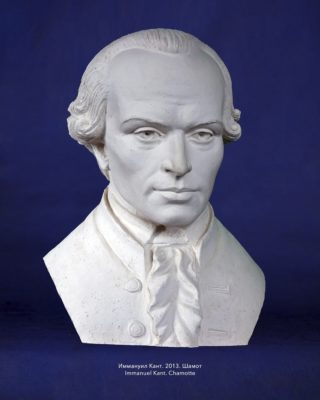IMMANUEL KANT. 2014
Author: Alexey Leonov
Material: Chamotte
Location: "ETNOMIR" Cultural Education Center
“Science is organized knowledge. Wisdom is organized life”.
IMMANUEL KANT – german philosopher, founder of German classical philosophy, worked on the edge of Enlightenment and Romanticism epochs (1724-1804).
As an agnostic, Kant denied the possibility of absolute cognition of the world by man, but he put forward the idea that not an object, but a subject – “the thing in itself” – is more important in the process of cognition. The main goal of cognition is formation of ethic, public morals, based on categorical imperative (total antecedent moral law). In this kind of system the person considered as a key value. Elaboration of ethical problems took a particular place in Kant’s activity. He devoted several works to this theme.
The main merit of the philosopher is the development of the original theory of knowledge, as well as ethical, aesthetic, anthropological and legal doctrines, which laid the foundation of German classical philosophy. Due to his ideas dialectic started actively develop and synthesis stared considered as a method of scientific research.
In addition, the philosopher was engaged in natural science problems: he developed a cosmogonic hypothesis of the origin of the solar system from a giant original gas nebula; outlined the idea of a genealogical classification of the animal world; put forward the idea of the natural origin of the human races; studied the role of flux and reflux on our planet.
“Groundwork of the Metaphysics of Morals“ (1785), “Critique of Practical Reason” (1788), “Metaphysics of Morals” (1797) and others.




